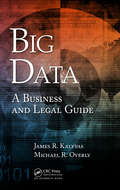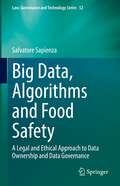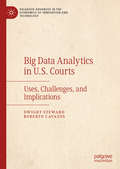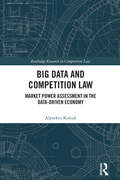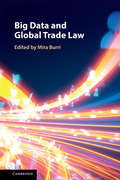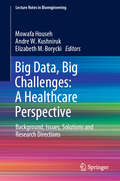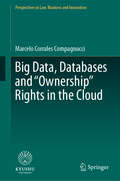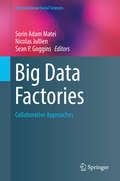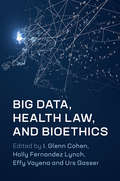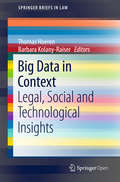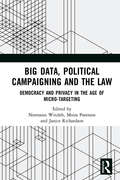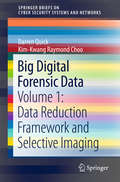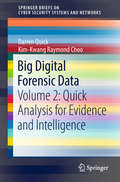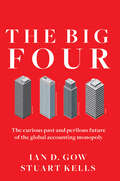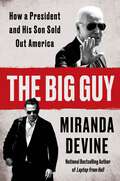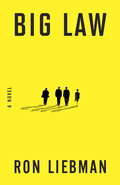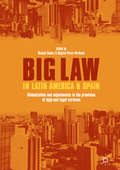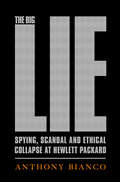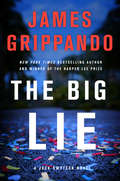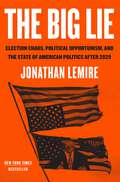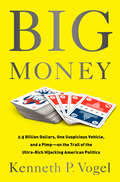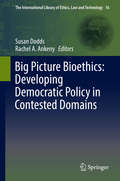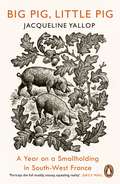- Table View
- List View
Big Crime and Big Policing: All about Big Money?
by Stephen Schneider Tonita Murray Elizabeth KirleyFollowing money over national borders, banking systems, casinos, and free trade zones, as well as the world of the corrupt elites, Big Crime and Big Policing brings new scholarly and practical insights into our understanding of the interplay of money, crime, and policing on the grand scale. In this wide-ranging volume, a mixed group of scholars and practitioners aim to show how money dictates the scope and nature of financial and corporate crimes, and the impact of these crimes on national economies, social institutions, and communal well-being alike. The book examines how the combined efforts of governments and international organizations fail to stop financial crime at its source and, despite apparently generous human and financial resources, police and law enforcement efforts ultimately fall short of defeating big crime and of meeting public safety needs. International in scope, Big Crime and Big Policing provides fresh reflection on a significant problem of our age, one that demands greater attention from governments and the public.
Big Data: A Business and Legal Guide
by James R. Kalyvas Michael R. OverlyBig Data: A Business and Legal Guide supplies a clear understanding of the interrelationships between Big Data, the new business insights it reveals, and the laws, regulations, and contracting practices that impact the use of the insights and the data. Providing business executives and lawyers (in-house and in private practice) with an accessible p
Big Data, Algorithms and Food Safety: A Legal and Ethical Approach to Data Ownership and Data Governance (Law, Governance and Technology Series #52)
by Salvatore SapienzaThis book identifies the principles that should be applied when processing Big Data in the context of food safety risk assessments. Food safety is a critical goal in the protection of individuals’ right to health and the flourishing of the food and feed market. Big Data is fostering new applications capable of enhancing the accuracy of food safety risk assessments. An extraordinary amount of information is analysed to detect the existence or predict the likelihood of future risks, also by means of machine learning algorithms. Big Data and novel analysis techniques are topics of growing interest for food safety agencies, including the European Food Safety Authority (EFSA). This wealth of information brings with it both opportunities and risks concerning the extraction of meaningful inferences from data. However, conflicting interests and tensions among the parties involved are hindering efforts to find shared methods for steering the processing of Big Data in a sound, transparent and trustworthy way. While consumers call for more transparency, food business operators tend to be reluctant to share informational assets. This has resulted in a considerable lack of trust in the EU food safety system. A recent legislative reform, supported by new legal cases, aims to restore confidence in the risk analysis system by reshaping the meaning of data ownership in this domain. While this regulatory approach is being established, breakthrough analytics techniques are encouraging thinking about the next steps in managing food safety data in the age of machine learning.The book focuses on two core topics – data ownership and data governance – by evaluating how the regulatory framework addresses the challenges raised by Big Data and its analysis in an applied, significant, and overlooked domain. To do so, it adopts an interdisciplinary approach that considers both the technological advances and the policy tools adopted in the European Union, while also assuming an ethical perspective when exploring potential solutions. The conclusion puts forward a proposal: an ethical blueprint for identifying the principles – Security, Accountability, Fairness, Explainability, Transparency and Privacy – to be observed when processing Big Data for food safety purposes, including by means of machine learning. Possible implementations are then discussed, also in connection with two recent legislative proposals, namely the Data Governance Act and the Artificial Intelligence Act.
Big Data Analytics in U.S. Courts: Uses, Challenges, and Implications (Palgrave Advances in the Economics of Innovation and Technology)
by Dwight Steward Roberto CavazosThis Palgrave Pivot identifies the key legal, economic, and policy issues surrounding the allowance to use and interpret electronic data consistently and in a scientifically valid manner in U.S. courts. Evidence based on the analysis of large amounts of electronic data ("Big Data") plays an increasing role in civil court disputes, providing information that could not have been obtained from a witness stand. While Big Data evidence presents opportunities, it also presents legal and public policy challenges and concerns. How can one be sure that deviations found in Big Data fall outside the norm? If statistical analyses can be conducted and presented different ways, how can judges and juries make sense of conflicting interpretations? When does Big Data extraction stop being investigative and instead become an invasion of privacy? This book traces the history of Big Data use in U.S. courts, couples current case studies with legal challenges to explore key controversies, and suggests how courts can change the way they handle Big Data to ensure that findings are statistically significant and scientifically sound.
Big Data and Competition Law: Market Power Assessment in the Data-Driven Economy (Routledge Research in Competition Law)
by Alptekin KoksalRecent studies on competition law and digital markets reveal that accumulating personal information through data collection and acquisition methods benefits consumers considerably. Free of charge, fast and personalised services and products are offered to consumers online. Collected data is now an indispensable part of online businesses to the point that a new economy, a data-driven sector, has emerged. Many markets such as the social network, search engine, online advertising and e-commerce are regarded as data-driven markets in which the utilisation of Big Data is a requisite for the success of operations. However, the accumulation and use of data brings competition law concerns as they contribute to market power in the online world, resulting in a few technology giants gaining unprecedented market power due to the Big Data accumulation, indirect network effects and the creation of online ecosystems. As technology giants have billions of consumers worldwide, data-driven markets are truly global. In these data-driven markets, technology giants abuse their dominant positions, but existing competition law tools seem ineffective in addressing market power and assessing abusive behaviour related to Big Data. This book argues that a novel approach to the data-driven sector must be developed through the application of competition law rules to address this. It argues that current and potential conflicts can be mitigated by extending the competition law assessment beyond the current competition law tools to offer a modernised and unified approach to the Big Data–related competition issues. Promoting new legal tests for addressing the market power of technology giants and assessing abusive behaviour in data-driven markets, this book advocates for cooperation between competition and data protection authorities. It will be of interest to students, academics and practitioners with an interest in competition law and data protection.
Big Data and Global Trade Law
by Mira BurriThis collection explores the relevance of global trade law for data, big data and cross-border data flows. Contributing authors from different disciplines including law, economics and political science analyze developments at the World Trade Organization and in preferential trade venues by asking what future-oriented models for data governance are available and viable in the area of trade law and policy. The collection paints the broad picture of the interaction between digital technologies and trade regulation as well as provides in-depth analyses of critical to the data-driven economy issues, such as privacy and AI, and different countries' perspectives. This title is also available as Open Access on Cambridge Core.
Big Data, Big Challenges: Background, Issues, Solutions and Research Directions (Lecture Notes in Bioengineering)
by Mowafa Househ Andre W. Kushniruk Elizabeth M. BoryckiThis is the first book to offer a comprehensive yet concise overview of the challenges and opportunities presented by the use of big data in healthcare. The respective chapters address a range of aspects: from health management to patient safety; from the human factor perspective to ethical and economic considerations, and many more. By providing a historical background on the use of big data, and critically analyzing current approaches together with issues and challenges related to their applications, the book not only sheds light on the problems entailed by big data, but also paves the way for possible solutions and future research directions. Accordingly, it offers an insightful reference guide for health information technology professionals, healthcare managers, healthcare practitioners, and patients alike, aiding them in their decision-making processes; and for students and researchers whose work involves data science-related research issues in healthcare.
Big Data, Databases and "Ownership" Rights in the Cloud (Perspectives in Law, Business and Innovation)
by Marcelo Corrales CompagnucciTwo of the most important developments of this new century are the emergence of cloud computing and big data. However, the uncertainties surrounding the failure of cloud service providers to clearly assert ownership rights over data and databases during cloud computing transactions and big data services have been perceived as imposing legal risks and transaction costs. This lack of clear ownership rights is also seen as slowing down the capacity of the Internet market to thrive. Click-through agreements drafted on a take-it-or-leave-it basis govern the current state of the art, and they do not allow much room for negotiation. The novel contribution of this book proffers a new contractual model advocating the extension of the negotiation capabilities of cloud customers, thus enabling an automated and machine-readable framework, orchestrated by a cloud broker.Cloud computing and big data are constantly evolving and transforming into new paradigms where cloud brokers are predicted to play a vital role as innovation intermediaries adding extra value to the entire life cycle. This evolution will alleviate the legal uncertainties in society by means of embedding legal requirements in the user interface and related computer systems or its code. This book situates the theories of law and economics and behavioral law and economics in the context of cloud computing and takes database rights and ownership rights of data as prime examples to represent the problem of collecting, outsourcing, and sharing data and databases on a global scale. It does this by highlighting the legal constraints concerning ownership rights of data and databases and proposes finding a solution outside the boundaries and limitations of the law. By allowing cloud brokers to establish themselves in the market as entities coordinating and actively engaging in the negotiation of service-level agreements (SLAs), individual customers as well as small and medium-sized enterprises could efficiently and effortlessly choose a cloud provider that best suits their needs. This approach, which the author calls “plan-like architectures,” endeavors to create a more trustworthy cloud computing environment and to yield radical new results for the development of the cloud computing and big data markets.
Big Data Factories: Collaborative Approaches (Computational Social Sciences)
by Sean P. Goggins Sorin Adam Matei Nicolas JullienThe book proposes a systematic approach to big data collection, documentation and development of analytic procedures that foster collaboration on a large scale. This approach, designated as "data factoring" emphasizes the need to think of each individual dataset developed by an individual project as part of a broader data ecosystem, easily accessible and exploitable by parties not directly involved with data collection and documentation. Furthermore, data factoring uses and encourages pre-analytic operations that add value to big data sets, especially recombining and repurposing. The book proposes a research-development agenda that can undergird an ideal data factory approach. Several programmatic chapters discuss specialized issues involved in data factoring (documentation, meta-data specification, building flexible, yet comprehensive data ontologies, usability issues involved in collaborative tools, etc. ). The book also presents case studies for data factoring and processing that can lead to building better scientific collaboration and data sharing strategies and tools. Finally, the book presents the teaching utility of data factoring and the ethical and privacy concerns related to it. Chapter 9 of this book is available open access under a CC BY 4. 0 license at link. springer. com
Big Data, Health Law, and Bioethics
by Holly Fernandez Lynch Urs Gasser I. Glenn Cohen Effy VayenaWhen data from all aspects of our lives can be relevant to our health - from our habits at the grocery store and our Google searches to our FitBit data and our medical records - can we really differentiate between big data and health big data? Will health big data be used for good, such as to improve drug safety, or ill, as in insurance discrimination? Will it disrupt health care (and the health care system) as we know it? Will it be possible to protect our health privacy? What barriers will there be to collecting and utilizing health big data? What role should law play, and what ethical concerns may arise? This timely, groundbreaking volume explores these questions and more from a variety of perspectives, examining how law promotes or discourages the use of big data in the health care sphere, and also what we can learn from other sectors. Focuses deeply on a particular type of big data - that which is health related - but covering a wide variety of issues, including privacy, research, regulation, and more, as well as philosophical and practical considerations. The book is timely, with a unique focus and coverage. In addition to thoughtful academic discussions, chapters contain proposed solutions to existing challenges, which take a variety of approaches, from market-based to regulatory
Big Data in Context: Legal, Social and Technological Insights (SpringerBriefs in Law)
by Thomas Hoeren Barbara Kolany-RaiserThis book is open access under a CC BY 4. 0 license. This book sheds new light on a selection of big data scenarios from an interdisciplinary perspective. It features legal, sociological and economic approaches to fundamental big data topics such as privacy, data quality and the ECJ's Safe Harbor decision on the one hand, and practical applications such as smart cars, wearables and web tracking on the other. Addressing the interests of researchers and practitioners alike, it provides a comprehensive overview of and introduction to the emerging challenges regarding big data. All contributions are based on papers submitted in connection with ABIDA (Assessing Big Data), an interdisciplinary research project exploring the societal aspects of big data and funded by the German Federal Ministry of Education and Research. This volume was produced as a part of the ABIDA project (Assessing Big Data, 01IS15016A-F). ABIDA is a four-year collaborative project funded by the Federal Ministry of Education and Research. However the views and opinions expressed in this book reflect only the authors' point of view and not necessarily those of all members of the ABIDA project or the Federal Ministry of Education and Research.
Big Data, Political Campaigning and the Law: Democracy and Privacy in the Age of Micro-Targeting
by Janice Richardson Moira Paterson Normann WitzlebIn this multidisciplinary book, experts from around the globe examine how data-driven political campaigning works, what challenges it poses for personal privacy and democracy, and how emerging practices should be regulated. The rise of big data analytics in the political process has triggered official investigations in many countries around the world, and become the subject of broad and intense debate. Political parties increasingly rely on data analytics to profile the electorate and to target specific voter groups with individualised messages based on their demographic attributes. Political micro-targeting has become a major factor in modern campaigning, because of its potential to influence opinions, to mobilise supporters and to get out votes. The book explores the legal, philosophical and political dimensions of big data analytics in the electoral process. It demonstrates that the unregulated use of big personal data for political purposes not only infringes voters’ privacy rights, but also has the potential to jeopardise the future of the democratic process, and proposes reforms to address the key regulatory and ethical questions arising from the mining, use and storage of massive amounts of voter data. Providing an interdisciplinary assessment of the use and regulation of big data in the political process, this book will appeal to scholars from law, political science, political philosophy and media studies, policy makers and anyone who cares about democracy in the age of data-driven political campaigning.
Big Digital Forensic Data: Volume 2: Quick Analysis For Evidence And Intelligence (SpringerBriefs On Cyber Security Systems And Networks)
by Kim-Kwang Raymond Choo Darren QuickThis book provides an in-depth understanding of big data challenges to digital forensic investigations, also known as big digital forensic data. It also develops the basis of using data mining in big forensic data analysis, including data reduction, knowledge management, intelligence, and data mining principles to achieve faster analysis in digital forensic investigations. By collecting and assembling a corpus of test data from a range of devices in the real world, it outlines a process of big data reduction, and evidence and intelligence extraction methods. Further, it includes the experimental results on vast volumes of real digital forensic data. The book is a valuable resource for digital forensic practitioners, researchers in big data, cyber threat hunting and intelligence, data mining and other related areas.
Big Digital Forensic Data: Volume 2: Quick Analysis for Evidence and Intelligence (SpringerBriefs on Cyber Security Systems and Networks)
by Darren Quick Kim-Kwang Raymond ChooThis book provides an in-depth understanding of big data challenges to digital forensic investigations, also known as big digital forensic data. It also develops the basis of using data mining in big forensic data analysis, including data reduction, knowledge management, intelligence, and data mining principles to achieve faster analysis in digital forensic investigations. By collecting and assembling a corpus of test data from a range of devices in the real world, it outlines a process of big digital forensic data analysis for evidence and intelligence. It includes the results of experiments on vast volumes of real digital forensic data. The book is a valuable resource for digital forensic practitioners, researchers in big data, cyber threat hunting and intelligence, data mining and other related areas.
The Big Four: The Curious Past and Perilous Future of the Global Accounting Monopoly
by Ian D. Gow Stuart KellsWith staffs that are collectively larger than the Russian army and combined revenues of over $130 billion a year, the Big Four accounting firms—Deloitte, PricewaterhouseCoopers, Ernst & Young, and KPMG—are a keystone of global commerce. But leading scholar Ian Gow and award-winning author Stuart Kells warn that a house of cards may be about to fall.Stretching back to the Medicis in Renaissance Florence, this book is a fascinating story of wealth, power, and luck. The founders of the Big Four lived surprisingly colorful lives. Samuel Price, for example, married his own niece. Between the world wars, Nicholas Waterhouse collected postage stamps while also hosting decadent parties in his fashionable London home. All four firms have endured major calamities in recent decades. There have been hundreds of court cases and legal prosecutions for failed audits, tax scandals, and breaches of independence. The firms have come so close to “extinction level events” that regulators have required them to prepare “living wills.” And today, the Big Four face an uncertain future—thanks to their push into China, their vulnerability to digital disruption and competition, and the hazards of providing traditional services in a new era of transparency. This account of the past, present, and likely future of the Big Four is essential reading for anyone perplexed or fascinated by professional services, working or considering working in the industry, or simply curious about the fate of the global economy.
The Big Guy: How a President and His Son Sold Out America
by Miranda DevineThe New York Post columnist, Fox News contributor, and national bestselling author of Laptop from Hell returns with the explosive, definitive account of the Biden family scandals. It’s rare that a campaign season has anything like an IRS whistleblower and a California US attorney saying they were blocked from pursuing charges, foreign wire transfers of millions of dollars going to several members of politician’s family, suspicious slap-on-the-wrist plea deals, mounds of incrimination texts, a previously unacknowledged child with a stripper, and multiple congressional investigations. It’s unprecedented to have them all tied to one politician like Joe Biden.The federal government and the mainstream media have been selling the narrative for years that Hunter Biden is a good son with addiction problems who has suffered enough. But what if the Biden family has been involved in sketchy financial dealings and coverups that get bigger every passing year?Miranda Devine goes deep into the dark underbelly of American politics, where it’s okay to break the law as long as you follow the rest of the elite’s rules. With a surgeon’s precision she dissects the shady dealings of the Biden family in China and Eastern Europe, exposing the cover-up within the government and media. With meticulous research and insider sources, Devine uncovers the shocking truth about Joe Biden's involvement in his son Hunter's business dealings and the extent of their corruption.Many have argued that intelligence agents and social media companies tilted the 2020 election in Biden’s favor by hiding the contents of Hunter’s laptop. Devine goes beyond their coverage to “silence the truth” and in The Big Guy finally reveals the corruption within the Biden family and the government.
Big Law: A Novel
by Ron Liebman“Big Law has it all. A locomotive drive, a fantastic, appealing, big-hearted narrative voice, and an inside and very entertaining look at the intersection of big law and big business. Smart and truly unputdownable.” —John Lescroart As a young partner at Dunn & Sullivan, one of New York's most prestigious law firms, Carney Blake has represented dozens of high-profile clients. But being a pawn of Big Law often means defending the corporate dirt bags of the world—the spillers, the drillers, and the killers. Morality aside, Carney is starting to make a name for himself, despite having a father who resents his success and an unpredictable big brother bent on self-destruction. So when Carney is suddenly asked by his firm's chairman to represent the plaintiffs in a class action lawsuit—and not, as usual, the corporate bad guys—he warily accepts. Maybe they're turning a corner, he thinks. And even if they aren't, when else has a junior partner been assigned such a major case, with a possible billion dollar payout? But Carney can't fool himself for very long. As he digs deeper into the case, he uncovers corruption and maliciously orchestrated schemes that go straight to the top of Dunn & Sullivan—along with the true motives behind his placement on the case. Written by former top litigator Ron Liebman, Big Law is a thrilling, fast-paced roman à clef that exposes the secrecy, deception, and machinations underlining America’s most powerful mega-firms.
Big Law in Latin America and Spain
by Manuel Gómez Rogelio Pérez-PerdomoThis book, part of the Stanford Law School research project on the future of the legal profession, thoroughly examines the future of “big law,” defined as the large and mid-size multiservice highly specialized law firms that provide sophisticated, complex and generally costly legal work to multinationals, large and mid-size domestic corporations, and other business clients. By systematically gathering, assessing, and analyzing the best available quantitative and qualitative data on the first tier of the corporate legal services market of Latin America and Spain, and interviewing a broadly representative sample of corporate legal officers, law firm partners, and other stakeholders in each of the countries covered, this book provides a nuanced perspective on changes in “big law” during the last two decades until the present. It also explores the factors that are driving these changes, and the implications for the future of legal profession, legal education and its relationship with the corporate sector and society in general.
The Big Leagues Go to Washington: Congress and Sports Antitrust, 1951-1989
by David George SurdamBetween 1951 and 1989, Congress held a series of hearings to investigate the antitrust aspects of professional sports leagues. Among the concerns: ownership control of players, restrictions on new franchises, territorial protection, and other cartel-like behaviors. In The Big Leagues Go to Washington, David Surdam chronicles the key issues that arose during the hearings and the ways opposing sides used economic data and theory to define what was right, what was feasible, and what was advantageous to one party or another. As Surdam shows, the hearings affected matters as fundamental to the modern game as broadcasting rights, player drafts and unions, league mergers, and the dominance of the New York Yankees. He also charts how lawmakers from the West and South pressed for the relocation of ailing franchises to their states and the ways savvy owners dodged congressional interference when they could and adapted to it when necessary.
The Big Lie: Spying, Scandal, and Ethical Collapse at Hewlett Packard
by Anthony BiancoHewlett Packard is an American icon, the largest information technology company in the world. The bedrock of Silicon Valley, it employs more than 300,000 people, its market capitalization is in excess of $100 billion and its products are in almost every home in the country where there is a printer or computer. In 2003 the company began a transition from the family management style of its founders. It made a bold statement by hiring as its new CEO the most visible female business executive in America: Carly Fiorina. Less than two years later, the board fired her, amid accusations of imperiousness that had begun damagingly to leak into the business media. The board at that time included one of Silicon Valley's most flamboyant venture capitalists and owner of the largest and most expensive yacht in the world, and a former CIA asset who believed he personally channeled the values of the company's founders. Each had a long and complicated history with HP, and each believed he should determine the company's future. They ran up against a corporate governance expert whom they could not roll, and a new CEO whose loyalties on the board were entirely opaque. In this way, the stage was set for a rancorous feud that split the board into implacably distrusting factions. In the middle of the damaging schism, HP introduced the Big Lie. The lie was pinned on the chairman, who was receiving treatment for stage 4 ovarian cancer. And it sizzled through a largely unquestioning media. Anthony Bianco gets to heart of the ethical morass at HP that ended up damning the entire board that created it. Almost every American has an interest in how the country's greatest corporations are run, and the character of the people entrusted with them. The story of Hewlett-Packard reflects power struggles that shape corporate America and is an alarming morality tale for our times.
The Big Lie: A Jack Swyteck Novel (Jack Swyteck Novel #16)
by James GrippandoAs the Electoral College battle for the White House lands in a Florida courtroom, Miami attorney Jack Swyteck has never felt farther from the truth, fighting for a “faithless elector,” caught between a corrupt president and his manipulative opponent—with each revelation more explosive than the next.The country is reeling. For the sixth time in American history, the winner of the popular vote will not occupy the Oval Office. President Malcolm MacLeod, the Machiavellian incumbent, was spared from impeachment only because his political foes were certain they would oust him at the ballot box. Now, he appears to have secured a second term, thanks to a narrow victory in the Electoral College. His opponent, Florida Senator Evan Stahl, saw his campaign rocked by allegations of an extramarital affair—with another man. Despite the salacious headline-making scandal and the surrounding media frenzy, most Americans chose Stahl to lead the politically polarized nation. But Stahl is refusing to concede. Backed by millions of supporters, he looks to individual members of the Electoral College to cross party lines.Gun lobbyist Charlotte Holmes is one of Floridas twenty-nine electors who is bound by law and by oath to cast her vote for MacLeod, who won Florida by the thinnest of margins. When Charlotte announces that she intends to vote her conscience and throw the Electoral College to Stahl, the president and his Florida machine haul her into court on felony charges—which, for some, isn’t nearly punishment enough.Miami attorney Jack Swyteck is going to use every legal maneuver he can to keep his new client free—and alive. MacLeod’s hand-picked prosecutor is determined to prove Charlotte is unfit to cast a vote. Dredging through her past, he’s looking for skeletons to humiliate and discredit her, while others with far deadlier intentions have begun acting on their threats. As the pressure mounts, Charlotte and Jack must decide how far they’ll go to stand their ground in the stand-your-ground state.
The Big Lie: Election Chaos, Political Opportunism, and the State of American Politics After 2020
by Jonathan LemireINSTANT NEW YORK TIMES BESTSELLERFrom the WHITE HOUSE BUREAU CHIEF OF POLITICO and the host of MSNBC's WAY TOO EARLY comes a probing and illuminating analysis of the current state of American politics, democracy, and elections.“[Lemire] has done his homework.” –The GuardianJonathan Lemire uncovers that “The Big Lie,” as it’s been termed, isn’t just about the 2020 election. It's become a political philosophy that has only further divided the two parties.Donald Trump first tried it out in 2016, at an August rally in Ohio. He said that perhaps he wouldn’t accept the election results in his race against Hillary Clinton, that the election was “rigged.” He didn’t have to challenge the result that year, but the stage was set. When he lost in 2020, he started the lie back up again and to devastating results: an insurrection at the Capitol in January 2021.In the more than five tumultuous, paradigm-shifting years of Donald Trump’s presidency and beyond, his near-constant lying has become a fixture of political life. It is inextricably linked with how his party behaves, how the Democrats respond to it, and how he remains relevant, even after a decisive loss in 2020. Jonathan Lemire brings his connections, profile, and dogged reportorial instincts to bear in his first book that explores how this phenomenon shapes our politics.Written with sharp political insight and detailed with dozens of interviews, The Big Lie is the first book to examine this unprecedented and tenuous moment in our nation’s politics.
Big Money: 2.5 Billion Dollars, One Suspicious Vehicle, and a Pimp-on the Trail of the Ultra-Rich Hijacking American Politics
by Kenneth P. VogelMark Hannauthe turn-of-the-century iron-and-coal-magnate-turned-operative who leveraged massive contributions from the robber baronsuwas famously quoted as saying: oThere are two things that are important in politics. The first is money, and I canOCOt remember what the second one is. OCO To an extent that would have made Hanna blush, a series of developments capped by the Supreme CourtOCOs 2010 Citizens United decision effectively crowned a bunch of billionaires and their operatives the new kings of politics. "Big Money" is a rollicking tour of a new political world dramatically reordered by ever-larger flows of cash. Ken Vogel has breezed into secret gatherings of big-spending Republicans and Democrats alikeufrom California poolsides to DC hotel barsuto brilliantly expose the way the mega-money men (and rather fewer women) are dominating the new political landscape. Great wealth seems to attach itself to outsize characters. From the casino magnate Sheldon Adelson to the bubbling nouveau cowboy Foster Friess; from the Texas trial lawyer couple, Amber and Steve Mostyn, to the micromanaging Hollywood executive Jeffrey Katzenberguthe multimillionaires and billionaires are swaggering up to the tables for the hottest new game in politics. The prize is American democracy, and the playersOCO checks keep getting bigger.
Big Picture Bioethics: Developing Democratic Policy in Contested Domains (The International Library of Ethics, Law and Technology #16)
by Susan Dodds Rachel A. AnkenyThis book addresses the problem of how to make democratically-legitimate public policy on issues of contentious bioethical debate. It focuses on ethical contests about research and their legitimate resolution, while addressing questions of political legitimacy. How should states make public policy on issues where there is ethical disagreement, not only about appropriate outcomes, but even what values are at stake? What constitutes justified, democratic policy in such conflicted domains? Case studies from Canada and Australia demonstrate that two countries sharing historical and institutional characteristics can reach different policy responses. This book is of interest to policymakers, bioethicists, and philosophers, and will deepen our understanding of the interactions between large-scale socio-political forces and detailed policy problems in bioethics. asdf
Big Pig, Little Pig: A Year on a Smallholding in South-West France
by Jacqueline YallopAs heard on BBC Radio 4's Book of the Week'A delightful and entertaining memoir' Woman and HomeWhen Jacqueline moves to south-west France with her husband, she embraces rural village life and buys two pigs to rear for slaughter. But as she gets to know the animals better, her English sentimentality threatens to get in the way and she begins to wonder if she can actually bring herself to kill them. This is a memoir about that fateful decision, but it's also about the ethics of meat eating in the modern age, and whether we should know, respect and even love the animals we eat. At its heart, this book is a love story, exploring the increasing attachment of the author for her particular pigs, and celebrating the enduring closeness of humans and pigs over the centuries.

